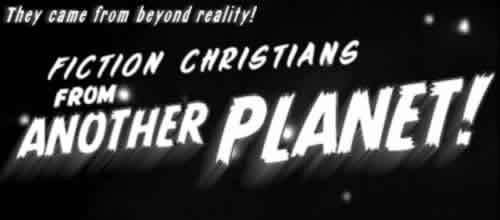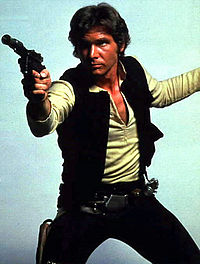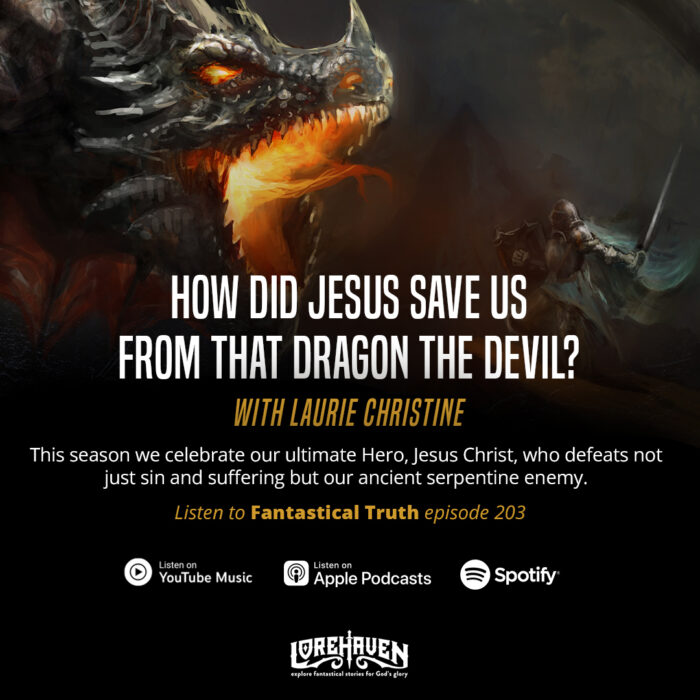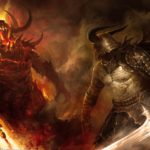Fiction Christians From Another Planet! I: Invasion Of The Child-People
If you love Star Wars, either casually or intensely, you have a favorite character especially from the prequel films, right? Surely that favorite would be Anakin Skywalker, eight years old, from Episode I: The Phantom Menace. That childlike innocence and free spirit just gets to you every time, doesn’t it? Powerful Darth Vader (as an adult) or roguish, shoot-first Han Solo? Pfshhh. You’ll take that blond-headed “now-this-is-pod-racing” waif any day.
Or switch Star universes. You think all those adults on the starship Enterprise, Captain Kirk, First Officer Spock — or Captain Picard, Cmdr. Data, First Officer Riker and the rest — can don red shirts and head off on away missions. On any stardate you’d much prefer hanging out with (or being) Wesley Crusher in that trim little gray shirt with the rainbow stripes.
 Of course all that is sarcasm. More likely, you have no such inclinations.
Of course all that is sarcasm. More likely, you have no such inclinations.
Such desires do not belong to most readers from planet Earth.
In that case, why do so many (not all) Christian novels keep presenting only kid-Anakin or Wesley Crusher, instead of Han Solo or Captain Picard, and expect readers to like them?
Alas, this applies to some Christian speculative novels, including one that I read months ago. (No, I won’t give the title here. Anyway, this applies to more than one author or novel.)
 In such novels, I keep wanting to meet and empathize with characters who are, for lack of a better adjective, heroic Christians. A Christian Han Solo or a Christian Captain Jean-Luc Picard. Or for that matter, someone of the robust personality, ambitions, and deep suffering of the Apostle Paul. Someone who despite his faults is committed to Christ and has been for years. Someone to whom I can look up, rather than looking down at or even across to him.
In such novels, I keep wanting to meet and empathize with characters who are, for lack of a better adjective, heroic Christians. A Christian Han Solo or a Christian Captain Jean-Luc Picard. Or for that matter, someone of the robust personality, ambitions, and deep suffering of the Apostle Paul. Someone who despite his faults is committed to Christ and has been for years. Someone to whom I can look up, rather than looking down at or even across to him.
Please don’t misunderstand. I don’t desire only such “tough” good-guy characters. Any story needs to have a protégé, a trainee or newcomer. This is especially true in fantasy universes full of strangeness: you need someone who is “normal,” an audience access-point or avatar.
But I am referring to stories whose “Christian” access-point characters are only ever naïve, silly, simplistic, “folk theologians,” and/or dairy factories of spiritual milk (Heb. 5: 12-13).
And note that when I refer to “Christians” in this column, and throughout this new serial, I also cover any fantasy-universe equivalents. People of the Path, the king’s mages, Light-Bearers, White Knights, resistance movements, Forces of Truth, Greater Galactic Guilds, Followers of the Eternal Flame, whichever — I cover them all by the term “Christian.”

Do adults prefer kid-Anakin to Han Solo? Who do even children prefer?
In these novels, rather than an appealing ensemble cast of accomplished heroes along with newcomers, I meet only kid-Anakin or Wesley Crusher, without even the redemptive arc for Anakin in the original Wars films or the maturity and better storylines for Wesley in later TNG seasons. Rather than questers, I meet jesters. Instead of Jedi knights, I meet naïve little children — or worse, Jar Jar Binks — along for the mission mainly to cause difficulties.
Here’s what I mean. In one novel set in the real world, one character was a non-Christian. Of the Christian characters he meets on his journey, all are one or more of the following:
- Reclusive,
- Spiritual-milk generators or “folk theologians,”
- Child-People.
Furthermore, it’s the non-Christian lead who is the most empathetic of the whole bunch. He’s more balanced, has a steady and professional job, and time enough for a long Jedi-like quest. Meanwhile, the Christians are simple farm boys who never leave the farm. And yet one of the novel’s themes is how he should become more like them. What’s all this?

Even Wesley Crusher became a more-complex, serious, and heroic figure in later Star Trek: The Next Generation seasons.
Here lies some legitimacy behind the (often-wrongly persistent) claim that Christian fiction is lame. These stories don’t introduce non-Christians to Christian heroes. Instead they’re asked to watch an Invasion of the Child-People. Then they’re told it’s best to be assimilated.
Meanwhile I, as a real-life Christian who would prefer meeting more people whose heroism and accomplishments I should want to imitate, instead meet dumbed-down folk “heroes.”
That doesn’t help me as a reader. It doesn’t challenge me. It’s not even fun. I don’t feel at home. Such stories, even the contemporary ones with speculative elements, instead have bizarre, otherworldly glows. Their skies are green and purple even on planet Earth. And I don’t know these people. Even the actual “folk theologian” heroes I know in reality have profound depth. They’re not silly like Jar Jar Binks. They’re not annoying like kid-Anakin.
So I can only conclude one thing: such stories’ characters are not even from planet Earth. They are — queue echoic retro 1950s Republic Pictures sci-fi serial announcer — creatures from beyond reality! They are: Fiction Christians from Another Planet!
We must explore this alien culture and its odd beliefs. That’s what I hope to do in this serial.








































[…] Recommended Article FROM http://www.speculativefaith.lorehaven.com/2013/01/10/fiction-christians-from-another-planet-i-invasion-of-the-… […]
Fiction Christians from Another Planet!
Part 1, 2, 3, or 8?
I haven’t noticed this before, but I’ll probably start paying more attention now to see if I can find them.
You had me at Han Solo. (It is perhaps no mystery that my favorite OT character is the bold, earthy Elijah, taunting the prophets of Baal and fleeing the wrath of Queen Jezebel and being ministered to in his desperation by perhaps a pre-incarnate Christ.)
So it seems you are simply looking for a different archetype than the most popular ones in Christian fiction?? I’m not sure I’ve read the same books you have, and I may be misunderstanding you. Are you saying the heroes of Christian spec-fic are anti-heroes with no growth or spiritual arcs? I can’t imagine telling a story like that. I know you don’t want to bash Christian authors in your article. Still, it would help if you gave some examples.
Not a replacement, but as I phrased it: “an appealing ensemble cast of accomplished heroes along with newcomers.” In some novels, the author limits himself to a Christian cast of “farm boys who never leave the farm.” That sells himself and readers short.
I refrained from some specific examples here because of a need to summarize the issue. In future installments I hope to explore more in-depth some specific tenets.
I, for one, would love to see a great Christian male warrior archetype. It would be even cooler if were a warrior scholar. He could mentor a team of up and coming warriors. That, I’m sure, had nothing to do with anything.
Hear, hear!
What about Teo from “The Chiveis Trilogy” by Bryan M. Liftin? He’s both a warrior and a scholar…
I haven’t read it. I might add it to my growing reading list, however.
I think Teo did meet most of the characteristics in the article.
But the women in the series . . . Well, they were disappointing. It’s a little bit depressing to read about a young woman who becomes the Proverbs 31 woman as soon as she reads a Bible for the first time. In fact, every woman was either Proverbs 31 or Jezebel.
But Teo was great!
I understand the need for a hero, but I also understand the need for the child-hero. We all often FEEL like children, even if we are grown-ups with lots of grown-up problems to try to solve, and that is why we identify with them. Furthermore, we enjoy thinking that if the breaks would just come our way, we could be the hero even though we’re really young and stupid!
Part of that is our current culture’s emphasis on self-esteem: tell ’em they’re special even if they’re not–we’ve all been effected by that and we all believe that we are just a little more special; that we could pull off a heroic action just by being us.
So it’s not all good, that child-hero thing; but on the other hand it’s not all bad, either. I do prefer having BOTH a child-hero that occasionally wins the day even though the adults in the room ignore or abuse him, and also a grown-up, mature, godly hero to whom the child-hero can aspire.
Gotta admit, one reason I don’t read a lot of fiction aimed at the Christian audience is the immaturity of its characters or its theology.
I, too, want robust heroes who aren’t afraid of “boldly going”, even if no one goes with them, even if the counsel doesn’t consent, even if he (or she) is seen as politically or culturally incorrect. Pure and impure motives may mingle in the same character. Pride and humility may struggle inside her. Fear and courage may get all tangled up in his head. Sometimes they view God rightly, and sometimes they need a course correction. That’s the way with most real folks; why not fictional? I’m weary of the too-nice heroes who are almost inhuman, they’re so perfect in speech and behavior and choices. Or who are so cute that they set my teeth on edge.
“I’m weary of the too-nice heroes who are almost inhuman, they’re so perfect in speech and behavior and choices. Or who are so cute that they set my teeth on edge.”
Yes! I have the same problem. It drives me insane. Those characters are so unreal it kills any enjoyment I have for the rest of the series, and I definitely have no inclination to read any of the author’s other books.
That’s what I’m after, Keanan: not characters who are legitimately immature or still growing — such as, say, a Luke Skywalker — but someone who is in effect comic relief — a Jar Jar Binks — or worse, a naive character who is held up as the ideal Christian.
Jesus endorsed the humility of a child, but also urged being “shrewd as serpents.”
I have to say, I haven’t seen Anakin or Wesley, but I found similar elements to be annoying with some Doctor Who companions. I don’t know if I’ve noticed similar elements in Christian works, but those characters without adult examples can be very annoying.
I just finished reading Diana Wynne Jones’s Reflections, a collection of her essays. One thing she says that fantasy fiction ought to do is to present a problem that we all encounter–an abusive parent, racism, whathaveyou–and set it someplace so strange that the reader can get outside the problem, walk around it and look at it from a different angle. The abusive parent becomes the monster in the wood the hero has to deal with. Racism becomes the story of the people who burn witches, even though the witches are born that way and can’t help being what they are.
Aspects of Christianity ought to be the same way–get outside them, walk around them, and evaluate the bizarre claims of the Gospel without all the man-made trappings that have built up over the centuries. But people don’t seem to have the imagination for that–they drag the trappings into the story, rather than getting outside them entirely.
One of the things that totally put me off Ted Dekker’s Green was the “church” service”. I’d been reading other fantasy, and that “church service” would have been an orgy in any other place. But instead it was a bunch of polite, Christian people celebrating love in the woods with no sexuality whatsoever.
It will be interesting to see where you will go with this. I tend to like skewed characters, so I’m not so much the best at commenting on the desire for Picards or Solos. Looking forwards to see your next post.
Actually, I liked and related to Wesley when I first watched TNG. I was a teen at the time and enjoyed the idea of a bright youngster getting a position of responsibility on this prestigious and sometimes overly serious starship. It wasn’t until I got further into the world of Star Trek that I learned that Wesley was almost universally reviled and criticized. Of course, that only made me like him more.
I think I see your point anyway. I’ll have to wait until your follow-ups for it to be fleshed out and see if we’re on the same page.
[…] is one alien belief of the invasive Christian novel-character “Child-People” I introduced last week: exclusive promotion that is not simply of childlike trust to believe in Christ’s own words about […]
[…] Childlike beings whose beliefs are limited to blind faith and voices from beyond. […]
[…] From Another Planet(!) series. That novel included Christian characters, more or less, of the child-people, blind-faith, living-the-voices-driven-life sort. But Biblically speaking, they were separate from […]
[…] Christianity. In some (not all) novels—and this includes some fantastical novels—Christians are “local color” side characters who assist weak seeker-friendly non-Christian heroes. Or they are members of a single, vaguely […]